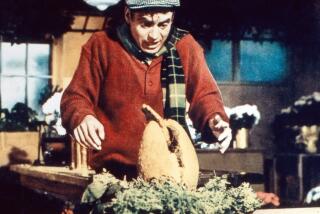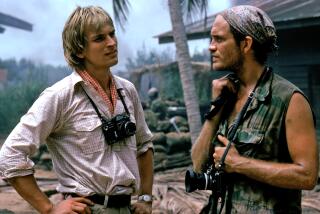Mr. Fields, the anarchic absurdist
- Share via
THE boozehound reputation and endless quotability of W.C. Fields have ensured his place in pop culture history. But that outsize persona and those cherished wisecracks, divorced from the context of his movies, tell only part of the story. Seen today, Fields’ best films prove that time has not in the least blunted the originality and complexity of his comedy.
Born William Claude Dukenfield in 1880, he was a vaudeville star by age 20. A skilled juggler and stage comic who performed in the Ziegfeld Follies, he worked steadily in films but graduated to movie star with the arrival of sound. Despite his talent for pantomime, silent films were probably not the best showcase for Fields: It’s hard now to think of him without also instantly hearing that inimitable, much-imitated voice -- part snarl, part drawl, hilarious and imperious, with more than a hint of an alcoholic’s slur.
His films are remarkably consistent in their themes and archetypes: He generally plays a curmudgeonly drunk or downtrodden everyman, usually trapped in a domestic nightmare (cue misogynist portrayal of shrewish wife), made bearable only by the blind adoration of a doting daughter. And of course, there are the floridly wacky character names: Larson E. Whipsnade, Ambrose Wolfinger, Eustace P. McGargle. (His screenwriting pseudonyms -- Otis Criblecoblis, Mahatma Kane Jeeves -- were equally fanciful.)
Universal’s new five-disc box “W.C. Fields Comedy Collection, Vol. Two” is an even richer compendium than 2004’s first volume. That set packaged a pair of acknowledged classics, “It’s a Gift” (1934) and “The Bank Dick” (1940), with relative trivialities such as “My Little Chickadee” (1940) and “You Can’t Cheat an Honest Man” (1939). Of the new batch, only one film -- “Poppy” (1936) -- could be considered disposable.
Some of Fields’ movies revel in a narrative experimentalism that would not be tolerated in most 21st century studio comedies. A pre-postmodern Charlie Kaufman film, “Never Give a Sucker an Even Break” (1941) -- the title is one of Fields’ best-known epigrams and had been uttered in earlier movies -- is the weirdest of the lot, a demented pinnacle of his anarchic absurdism. In his last starring role (he died Christmas Day 1946, and in the intervening years appeared only in bit parts), Fields plays himself and devotes much of the movie to a pitch meeting, which segues into excerpts from his “unfilmable” script.
One of Fields’ gentler films, “The Old Fashioned Way” (1934), is also a meta-fiction of sorts. It opens in standard antic mode, with Fields as a beleaguered theater troupe leader before settling into a play-within-the-film and is notable for being the rare movie in which Fields shows off his juggling prowess.
The other two titles in the set are among his best and yet least-seen films. “The Man on the Flying Trapeze” (1935), which Fields stepped in to direct after Clyde Bruckman quit mid-production, is a leisurely pleasure, amicably drifting from one misadventure to another. It opens with the Fields character’s desultory investigation of singing burglars in his cellar and climaxes with the predictable complications that ensue when he asks his boss for the day off to attend the funeral of his despised (but very much alive) mother-in-law.
Directed by Erle Kenton, “You’re Telling Me!” (1934) is another remake of a Fields silent (1927’s “So’s Your Old Man”). He plays a tipsy inventor whose latest humiliating failure (the puncture-proof tire) has driven him to the brink of suicide. Salvation arrives in the unlikely form of a European princess. Often very funny, it’s also one of Fields’ most touching and dramatically coherent films.
Fields’ instinctive aversion to sentimentality is evident in his every huffy gesture, even in his facial physiognomy. More than almost any popular comedian before or since, his humor is rooted in sadness or solitude. The miracle is that you never feel sorry for him, not least because he himself never did.
More to Read
Only good movies
Get the Indie Focus newsletter, Mark Olsen's weekly guide to the world of cinema.
You may occasionally receive promotional content from the Los Angeles Times.







